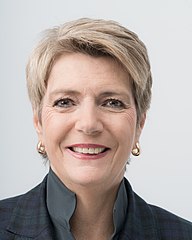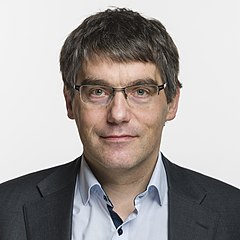|
2023 Swiss Federal Council election
An election for all seven members of the Federal Council, Switzerland's government, were held on 13 December 2023 for the 2024–2028 term. It followed the federal election held a month earlier and partly depended on its results. All Federal Councillors except Alain Berset were running for re-election. Per an informal agreement between the political parties known as the magic formula, incumbents are traditionally left unopposed and open seats are only contested by the incumbent's party, ensuring the partisan balance. The federal assembly elected Beat Jans to replace Alain Berset after three rounds of voting. All other councillors were re-elected. Elections for President of the Swiss Confederation and Vice President of the Federal Council, as well as for Chancellor of Switzerland, also took place; Federal Councillor Viola Amherd was elected president for the year 2024 following an informal rotation agreement. After the election the federal departements were reshuffled. The Federal Department of Home Affairs (formerly led by Alain Berset) is now being led by Élisabeth Baume-Schneider, whose former department, the Federal Department of Justice and Police, is now being led by newly-elected Beat Jans. BackgroundIn Switzerland, the 7-seat executive Federal Council is elected by the Federal Assembly (both chambers of the legislature sitting together); in practice it is apportioned between the parties following the unwritten agreement known as the "magic formula". The formula was followed from 1959 to 2003 and in a different composition between 2003 and 2007 and again since 2015. Since 2016 the composition has been: SVP 2 seats, SP 2 seats, FDP 2 seats, and Die Mitte (succeeding the CVP) 1 seat. Federal councillors are traditionally re-elected until they step down; only four have ever lost re-election. Councillors tend to stand down during their term in order to ensure their party retains their seat and to allow their party to get more visibility at a moment other than shortly after a general election.[1] These by-elections were held only ten months before the 2023 federal election. On 21 June 2023, a few days after the results of the June referendums, social-democratic councillor Alain Berset announced he would resign effective 31 December, after serving for 12 years. He described the referendum of the amendment to the COVID-19 Act as an end to "the Covid cycle", which defined his third term as head of the Federal Department of Home Affairs.[2] Following the existing precedent, only SP candidates were expected to stand for his seat. In the previous Federal Council elections in 2022 when Simonetta Sommaruga resigned, her party, the SP chose to only nominate women as to ensure that the gender balance on the council would not be disturbed. Daniel Jositsch who had previously announced to run in 2022, then had to retract his candidacy but nevertheless received a significant number of protest votes. During that election, he did not publicly encourage the federal assembly to not vote for him, which has been criticised by members of his party. Jositsch again stood for the nomination in 2023. After not being chosen, there was speculation that he would again receive protest votes, possibly even being elected in spite of not being nominated by his party. Moreover, the Green party called the distribution of the Federal Council into question as they had previously done in 2019 on the ground that the right-wing parties SVP and FDP were in a majority on the Federal Council but had lost that majority in the federal assembly. Hence, they announced they would attack an unspecified seat of the FDP. While the SP shared the greens point of view, they did not officially support the green bid due to the other parties announcing that if the green candidate were to be elected the other parties would not support the official candidates of the SP in the election to succeed Alain Berset, which was to happen after the other members election. The retirement of Alain Berset left the position of head of the Federal Department of Home Affairs open for the first time since 2011. Electoral systemA person is elected if they receive an absolute majority of the valid votes cast. If no one receives an absolute majority the voting proceeds via an exhaustive ballot, each seat being filled independently. The order in which the seats are filled is the order of seniority of the members of the council standing for re-election and then the vacant seats (in order of seniority of the councillors that previously held these now vacant seats). In the first two rounds members of the Federal Assembly can vote for anyone eligible, but only those receiving at least ten votes are announced in the results; from the third round onwards only candidates who received at least ten votes in one of the first two rounds are eligible, the last-placed candidate is eliminated until someone reaches an overall majority.[3][4] The ballots are cast in secret. Federal AssemblyThe composition of the Federal Assembly will depend on the composition of the National Council and Council of States after the 2023 Swiss federal election.
Candidates for the Federal CouncilIncumbentsIncumbents, in descending order of seniority, including political party affiliation and department at the time of the election:
Candidates to Berset's seatDeclaredThe following individuals had announced their candidacy:
Beat Jans and Jon Pult have been officially nominated by their party on a ticket to fill the seat vacancy created by Alain Berset. PotentialThe following individuals had been subject of speculation about their potential candidacy:[2][11]
Declined to be candidateThe following individual has been the subject of speculation about her possible candidacy, but has publicly denied interest in running.
Candidates to other seatsThe Greens re-affirmed their claim to a seat in the Council, preferably the FDP seat of Ignazio Cassis, despite losing vote share in the October elections and nominated the following individual.[2][13] This candidacy was not supported by any other parliamentary group in the federal assembly.
Candidates for Federal ChancellorDue to the vacancy created by the resignation of Federal Chancellor Walter Thurnherr (The Centre), the following individuals had announced their candidacy:
ResultsOpen seat vacated by Alain BersetFollowing the retirement of the incumbent President and Federal Councillor Alain Berset (SP-FR), an election of the replacement has been held. Beat Jans (SP-BS), Basel-Stadt executive councillor since 2021, has been elected member of the Federal Council in the third round of voting with 134 votes, beating states councillor Daniel Jositsch (SP-ZH), who received votes despite not being nominated by any parliamentary group, and national councillor Jon Pult (SP-GR).
Seat held by Guy ParmelinGuy Parmelin (SVP-VD) was reelected in the first round of voting.
Seat held by Ignazio CassisIgnazio Cassis (FDP-TI) was reelected in the first round of voting. The Greens decided to challenge both FDP.The Liberals seats in the Federal Council as they had done in the 2019 elections and fielded Green Party national councillor Gerhard Andrey to challenge the seats. His candidacy presumably gathered green and some green liberal votes (the votes are cast in secret), but failed to get social democratic voters, thus Ignazio Cassis was re-elected outright without a second round of voting.
Seat held by Viola AmherdViola Amherd (DM-VS) was reelected in the first round of voting.
Seat held by Karin Keller-SutterKarin Keller-Sutter (FDP-SG) was reelected in the first round of voting.
Seat held by Albert RöstiAlbert Rösti (SVP-BE) was reelected in the first round of voting.
Seat held by Élisabeth Baume-SchneiderÉlisabeth Baume-Schneider (SP-JU) was reelected in the first round of voting.
Additional votesFederal Chancellor
The Federal Chancellor is a technocratic position and not a voting member of the Federal Council, but they are elected after the seven ministers using the same rules. Following the resignation of the incumbent Chancellor Walter Thurnherr (The Centre), an election of the replacement has been held. Viktor Rossi (GLP), a Vice-Chancellor since 2019, has been elected a new Chancellor in the second round of voting with 135 votes, beating Gabriel Lüchinger (SVP).[14]
President of the Confederation
The President of the Confederation is a member of the Federal Council elected every year, with no additional powers apart from chairing meetings of the Federal Council. Viola Amherd (DM-VS) was elected in the first round of voting.[15]
Vice President of the Federal CouncilThe Vice President of the Federal Council is a member of the Federal Council elected every year like the President, and the presumptive president for the next year. Karin Keller-Sutter (FDP-SG) was elected in the first round of voting.[15]
Departmental reshuffleAfter the elections, the newly elected council meets to assign the departments of the Federal administration to each councillor. The departments are attributed by a council decision; in practice, each member announces their preference in order of seniority leaving the newly-elected members last, and the council adopts their preferences. In 2018, as Viola Amherd and Karin Keller-Sutter were elected on the same day, the council chose to let Keller-Sutter choose earlier despite having been elected slightly later.[16] The resignation of Alain Berset left the Federal Department of Home Affairs open for the first time since 2011. In a surprise reshuffle Élisabeth Baume-Schneider took over the Department of Home Affairs after serving as head of the justice and police department for only one year. Newly-elected Beat Jans took over the Federal Justice and Police Department previously led by Baume-Schneider. The other departments remained with their previous heads.[17] The reshuffle was announced on 14 December 2023 and took effect on 1 January 2024. References
|
|||||||||||||||||||||||||||||||||||||||||||||||||||||||||||||||||||||||||||||||||||||||||||||||||||||||||||||||||||||||||||||||||||||||||||||||||||||||||||||||||||||||||||||||||||||||||||||||||||||||||||||||||||||||||||||||||||||||||||||||||||||||||||||||||||||||||||||||||||||||||||||||||||||||||||||||||||||||||||||||||||||||||||||||||||||||||||||||||||||||||||||||||||||||||||||||||||||||||||||||||||||||||||||||||||||||||||||||||||||||||||||||||||||||||||||||||||||||||||||||||||||||||||||||||||||||||||||||||||||||||||||||||||||||||||||||||||||||||||||||||||||||||||||||||||||||||||||||||||||||||||||||||||||||||||||||||||||||||||||||||||||||||||||||||||||||||||||||||||||||||||||||||||||||||||||||||||||


































